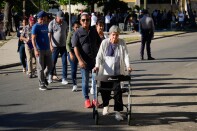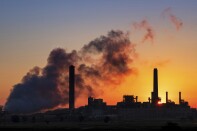This story is free to read because readers choose to support LAist. If you find value in independent local reporting, make a donation to power our newsroom today.
Trump's new tariffs on imported cars could have a clear winner: Tesla

President Trump's newly announced 25% import tariffs on foreign cars will increase vehicle prices by thousands of dollars for cars coming from Germany, Japan, and South Korea, as well as for the U.S.-assembled autos that use foreign-made parts, according to most auto industry experts.
However, one company likely to fare better than others is Tesla, the electric vehicle manufacturer led by close Trump administration adviser Elon Musk, industry analysts say.
Trump's latest move, set to take effect on April 2, is part of a broader global trade war launched as one of the opening acts of his second term. When announcing the new tariffs on Wednesday, he said: "What we're going to be doing is a 25% tariff on all cars that are not made in the United States. If they're made in the United States, it is absolutely no tariff."
By that standard, it would stand to reason that Tesla, which makes all the cars it sells in the U.S. in Texas and California, might be immune to effects of the tariffs. But Musk posted Wednesday on X that it wasn't so.
"Important to note that Tesla is NOT unscathed here. The tariff impact on Tesla is still significant," he wrote.
Even so, according to auto industry analyst Daniel Ives of Wedbush Securities, "Tesla is the one least impacted" among U.S. carmakers.
That's welcome news for Tesla, whose vehicle sales have taken a hit in recent months amid consumer anger over Musk's central role in helping the president slash and dismantle government agencies. That's led to massive protests at Tesla dealerships, and even vandalism aimed directly at the company's vehicles, chargers and storefronts — which U.S. Attorney General Pam Bondi has referred to as "domestic terrorism."
Tesla's first quarter sales in the U.S. are expected to be down 14.5% from the final three months of 2024, according to a report released this week by Cox Automotive, although it also shows that Tesla has been losing market share against EV competitors since 2020.
Sales of Teslas have dropped even more sharply across Europe, falling in February a whopping 76% in Germany, more than 50% in France, Italy and Portugal and nearly as much in Norway and Denmark, according to data from the European Automobile Manufacturers Association. This dip occurred even as overall EV sales across the region increased by nearly a third.
Tesla's share price has also experienced a precipitous drop, losing about 45% between its December peak and the market close on Thursday.
Teslas have 'substantially more U.S. content'
As Musk has suggested, Tesla won't be entirely spared from the tariffs. But the company's Model Y sport utility vehicle and Model 3 sedan — bestsellers in the American market — have faced increasingly stiff competition from vehicles that could be harder hit by the import tariffs, such as the Ford Mustang Mach-E, assembled in Mexico, and Hyundai's Ioniq 5, made in South Korea as well as the U.S.
Still, foreign-made auto parts would also be subject to the new tariffs, and Teslas contain 30% to 40% foreign-sourced components, according to Ives.
"Finding a truly U.S. manufactured car with all U.S. parts is a fictional story," he says.
Patrick Anderson, principal and CEO of Anderson Economic Group, or AEG, agrees that there's basically no such thing as a truly U.S.-produced vehicle. "All the cars we consider American cars are assembled from parts, subassemblies, engines, transmissions and other components that have been built in Canada and Mexico as well as in other countries," he says.
But Tesla's cars have "substantially more U.S. content than others," Anderson acknowledges.
Retaliatory tariffs would drive prices up further
Prior to the announcement of import tariffs on automobiles this week, AEG estimated in February that 20% tariffs imposed by the Trump White House on Chinese steel and aluminum could increase the cost of some electric vehicles by as much as $12,000, Anderson says.
But another hit for U.S. automakers could be lurking right around the corner if the tariffs go ahead as planned, Ives says. "Retaliatory is the biggest concern," he says, referring to probable counter-tariffs from Europe and Asia.
On the news of the latest U.S. tariffs, European stocks on Thursday took a beating, erasing billions of euros in gains for the year and hitting shares of the continent's automakers especially hard.
Germany's economic affairs Minister Robert Habeck remarked ominously on Thursday, "It needs to be clear that we will not take this lying down." And in a statement issued this week, European Commission President Ursula von der Leyen called the U.S. tariff move "bad for businesses, worse for consumers."
"Of course, we're expecting that Canada and Mexico and probably Europe [will] impose some kind of retaliatory tariffs because that's been the rule in international trade for a long time," Anderson says.
Such retaliatory tariffs would likely make Teslas more expensive in some of the company's most important markets abroad. In China, for instance, the company said it sold a record 657,000 cars in 2024, or 8.8% of its total sales. In Canada, Tesla sold an estimated 46,000 vehicles in 2024, up from in 2023.
If other countries do go ahead and levy retaliatory tariffs, Tesla "clearly is going to be negatively impacted," as time goes on, Ives says.
Copyright 2025 NPR










